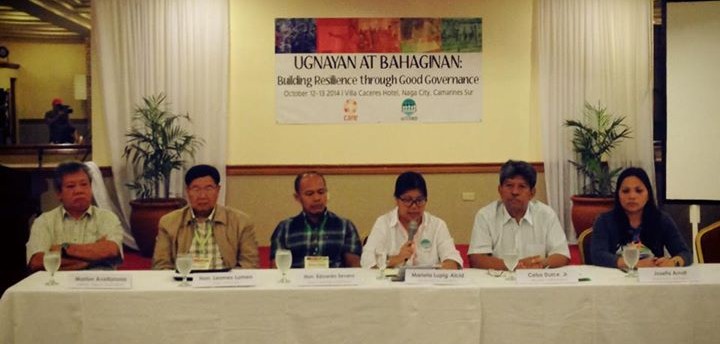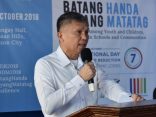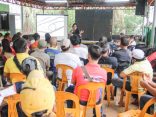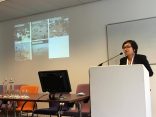 Statement read by Marieta Lupig Alcid (third from the right in the photo), ACCORD Executive Director, during the press conference for “Ugnayan at Bahaginan: Building Resilience through Good Governance.” A national conference that brought together ACCORD’s partner LGUs across the country to share and learn from each other’s experiences in DRR, “Ugnayan at Bahaginan” was held in celebration of the International Day for Disaster Risk Reduction last October 13, 2014.
Statement read by Marieta Lupig Alcid (third from the right in the photo), ACCORD Executive Director, during the press conference for “Ugnayan at Bahaginan: Building Resilience through Good Governance.” A national conference that brought together ACCORD’s partner LGUs across the country to share and learn from each other’s experiences in DRR, “Ugnayan at Bahaginan” was held in celebration of the International Day for Disaster Risk Reduction last October 13, 2014.
Press Conference Statement
To the members of the panel, the participating local government unit representatives, our friends from the media, ladies & gentlemen, a pleasant morning.
Marking the International Day for Disaster Risk Reduction 2014, representatives from 18 municipalities across 9 regions, as well as from national government agencies & civil society groups, have gathered here today in Naga City for “Ugnayan and Bahaginan: Building Resilience through Good Governance.”
Disasters have been affecting the Philippines in increasing frequency and magnitude. More and more people are affected, and the developmental gains of the most at-risk communities have been set further back.
The government has the primary responsibility to provide its citizens with a life of dignity and safety. However, there remains a need to strengthen the capacity of local government units (LGUs), as the front liners in their particular areas, in implementing disaster risk programs so that they are better able to fulfill their mandate.
With its participants coming from a variety of backgrounds and experiences with disasters, this is just what this conference aims to achieve: provide LGUs a venue for the exchange of experiences and synthesis of lessons in climate-smart and ecosystem-based disaster risk reduction or DRR-CCA-EMR.
The success of our partner municipalities has proven that DRR-CCA-EMR, which is the integration of climate change adaptation (CCA) and ecosystems management and restoration (CCA) with disaster risk reduction (DRR), is more effective in addressing the underlying causes of vulnerability to disasters.
This success need not be limited to them only. All of us here are one in calling on other municipalities, local government units, as well as the national government and other CSOs, to adopt the DRR-CCA-EMR framework. Inclusive and participatory risk assessments must be the basis for planning short, medium & long-term development policies and programs.
For our efforts to be effective, it is not enough to do DRR by ourselves. By nature, disasters do not know of political boundaries. Coordinated multi-sectoral and multi-disciplinary actions are needed if we are to reduce disaster risks across our common ecosystems and landscapes.
While LGUs should spearhead the process, we should ensure that ordinary citizens, especially the most vulnerable and affected by disasters, are engaged and can participate meaningfully. Together with scientific-based knowledge provided by agencies such as PAGASA, we can generate and sustain efforts towards effectively addressing disaster risks.
With the Hyogo Framework of Action (HFA) coming to its end in 2015, and the sunset review of R.A. 10121, or the Disaster Risk Reduction and Management Act of 2010, happening in the same year, this conference and other similar efforts to consolidate learnings become all the more relevant. It is imperative that LGUs, the communities they represent, and their civil society partners participate in the evaluation of these mechanisms. We therefore call on the national government to provide participatory spaces for our inputs. This will help ensure that the needs and rights of the most vulnerable communities are taken into consideration in improving these frameworks.
Such needs should be the primary consideration in calling for reforms to these relevant laws. Primarily, we believe that the allocation of disaster preparedness funds should be according to the level of vulnerability, not on the economic capacity, of the LGU concerned. It is usually the poorest barangays and municipalities who bear the brunt of disasters. They should receive the maximum support of the government and their countrymen in strengthening their resilience.
We likewise call on the government to immediately clarify and approve the implementing rules and regulations of the People’s Survival Fund. The most at-risk communities must be able to access the P1-billion allotment designated under the law for climate change adaptation.
In closing, we emphasize the point that the issue of resilience is intimately bound with that of good governance, which should not be only participatory and accountable but also effective and efficient. Strengthening the resilience of communities against disaster risks is only achievable if good governance exists. We would like to thank our partner LGUs for showing us that such a goal is doable, and despite the inherent challenges, sustainable.
We will be having a simple ceremony to sign a unity statement after the conference later today. We hope you can still join us in doing that later, but for now, we are open to your questions.
Statement read by Marieta Lupig Alcid (third from the right in the photo), ACCORD Executive Director, during the press conference for “Ugnayan at Bahaginan: Building Resilience through Good Governance.” A national conference that brought together ACCORD’s partner LGUs across the country to share and learn from each other’s experiences in DRR, Ugnayan at Bahaginan was held in celebration of the International Day for Disaster Risk Reduction last October 13, 2014.




